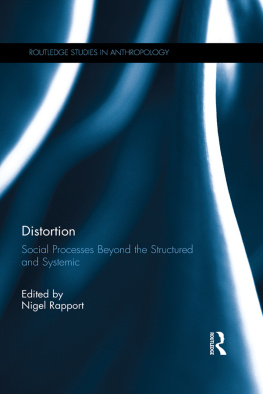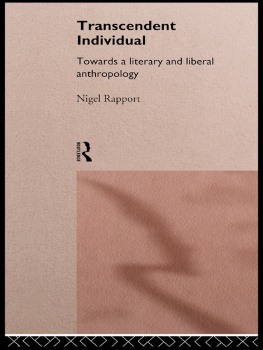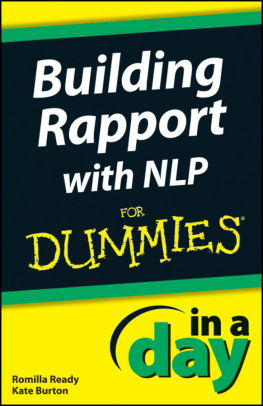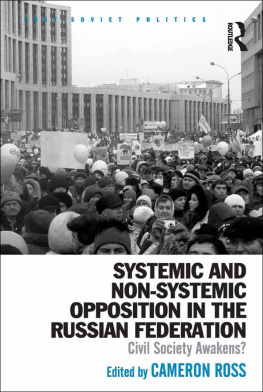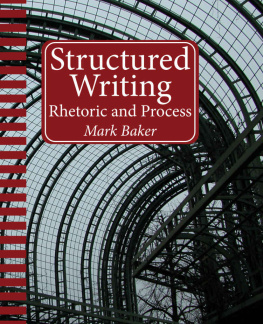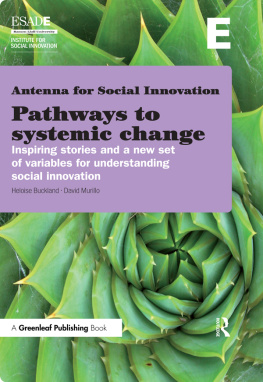Rapport - Distortion: social processes beyond the structured and systemic
Here you can read online Rapport - Distortion: social processes beyond the structured and systemic full text of the book (entire story) in english for free. Download pdf and epub, get meaning, cover and reviews about this ebook. City: Abingdon;Oxon;New York;NY, year: 2018, publisher: Taylor & Francis (CAM);Routledge, genre: Politics. Description of the work, (preface) as well as reviews are available. Best literature library LitArk.com created for fans of good reading and offers a wide selection of genres:
Romance novel
Science fiction
Adventure
Detective
Science
History
Home and family
Prose
Art
Politics
Computer
Non-fiction
Religion
Business
Children
Humor
Choose a favorite category and find really read worthwhile books. Enjoy immersion in the world of imagination, feel the emotions of the characters or learn something new for yourself, make an fascinating discovery.
Distortion: social processes beyond the structured and systemic: summary, description and annotation
We offer to read an annotation, description, summary or preface (depends on what the author of the book "Distortion: social processes beyond the structured and systemic" wrote himself). If you haven't found the necessary information about the book — write in the comments, we will try to find it.
Rapport: author's other books
Who wrote Distortion: social processes beyond the structured and systemic? Find out the surname, the name of the author of the book and a list of all author's works by series.
Distortion: social processes beyond the structured and systemic — read online for free the complete book (whole text) full work
Below is the text of the book, divided by pages. System saving the place of the last page read, allows you to conveniently read the book "Distortion: social processes beyond the structured and systemic" online for free, without having to search again every time where you left off. Put a bookmark, and you can go to the page where you finished reading at any time.
Font size:
Interval:
Bookmark:

Distortion occurs between the intentions of actions and their outcomes. It can also occur between thoughts and actions; between words and how they are interpreted; between a statement of law and its enactment; between a vision and its artistic representation; and between a cultural tradition or habitus and its animation in contemporary contexts. Escaping the bounds of relationality, of structuration and of systemics, distortion is a form of complex connectedness that has seldom been addressed in the social sciences as a phenomenon in its own right.
This volume argues for the key importance of distortion as a concept in the social sciences, and attempts to refine it as a concept. Each chapter examines distortion in the context of an ethnographic case study, examining how its conceptualization can further comprehension of a particular ethnographic situation. It is contended that distortion is an account of the emergent or revolutionary nature of human life, an emergence that can be attached to particular antecedent conditions in a processual or temporal way yet is a transformation of the essential nature of those conditions.
Coming to terms with distortion adds significantly to the social-scientific appreciation of human activity and creativity, of conscious experience, of the nature of social interaction and exchange, and of the complexity of social milieu. Distortion should be essential reading on advanced undergraduate and postgraduate modules on social theory, contemporary issues and methodologies, communication, sociality, materiality, and intersectionality.
Nigel Rapport is Professor of Anthropological and Philosophical Studies in the Department of Social Anthropology at the University of St Andrews, UK.
Routledge Studies in Anthropology
For a full list of titles in this series please visit www.routledge.com/Routledge-Studies-in-Anthropology/book-series/SE0724
Truth, Intentionality and Evidence
Anthropological Approaches to Crime
Edited by Yazid Ben Hounet and Deborah Puccio-Den
Meeting Ethnography
Meetings as Key Technologies of Contemporary Governance, Development, and Resistance
Edited by Jen Sandler and Renita Thedvall
Toward an Anthropology of Ambient Sound
Edited by Christine Guillebaud
On Knowing Humanity
Insights from Theology for Anthropology
Edited by Eloise Meneses and David Bronkema
Everyday Faith in Sufi Senegal
Laura L. Cochrane
Counterfeit Itineraries in the Global South
The Human Consequences of Piracy in China and Brazil
Rosana Pinheiro-Machado
Meaning and Significance in Human Engagement
A Cognitive Approach to Culture
David B. Kronenfeld
Distortion
Social Processes Beyond the Structured and Systemic
Edited by Nigel Rapport
The Greek Crisis
Critical Anthropological Explorations and Ethnographic Approaches
Edited by Dimitris Dalakoglou and Georgos Agelopoulos
Social Processes Beyond the Structured and Systemic
Edited by
Nigel Rapport

First published 2018
by Routledge
2 Park Square, Milton Park, Abingdon, Oxon OX14 4RN
and by Routledge
711 Third Avenue, New York, NY 10017
Routledge is an imprint of the Taylor & Francis Group, an informa business
2018 selection and editorial matter, Nigel Rapport; individual chapters, the contributors
The right of Nigel Rapport to be identified as the author of the editorial material, and of the authors for their individual chapters, has been asserted in accordance with sections 77 and 78 of the Copyright, Designs and Patents Act 1988.
All rights reserved. No part of this book may be reprinted or reproduced or utilised in any form or by any electronic, mechanical, or other means, now known or hereafter invented, including photocopying and recording, or in any information storage or retrieval system, without permission in writing from the publishers.
Trademark notice: Product or corporate names may be trademarks or registered trademarks, and are used only for identification and explanation without intent to infringe.
British Library Cataloguing-in-Publication Data
A catalogue record for this book is available from the British Library
Library of Congress Cataloging-in-Publication Data
A catalog record for this title has been requested
ISBN: 978-1-138-23065-1 (hbk)
ISBN: 978-1-315-31754-0 (ebk)
Typeset in Sabon
by Book Now Ltd, London
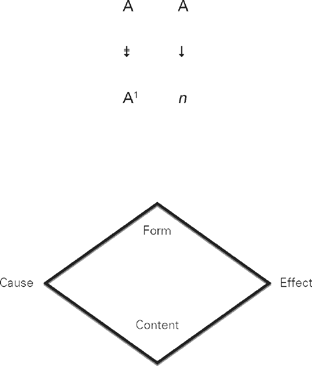
The best laid schemes o Mice an Men, Gang aft agley
Robert Burns, from To a Mouse
Conceptualizing the distortion of human social life
NIGEL RAPPORT
Contorted environments and distorted being
HENRIK VIGH
A blind mans problem: Distortion and non-responsiveness; or, the construction of non-futures in Danish bureaucracy
NINA HOLM VOHNSEN
Distortion and Stanley Spencers life in art
NIGEL RAPPORT
The politics of paradox: Kierkegaardian theology and national conservatism in Denmark
MORTEN AXEL PEDERSEN
Into the crack: Scottish agricultural revolutions and the art of moaning
MORTEN NIELSEN
Chains of distortion: Awkward relations and productive resistance in a Danish consulting company
LISE RJSKJR PEDERSEN
Hello, can you hear me better now? Mediatized acoustemologies and distortion on the radio
SANDRA LORI PETERSEN
Epi-pro-logue: An anthropological theory of distortion
MORTEN NIELSEN AND MORTEN AXEL PEDERSEN
Morten Nielsen is Associate Professor in the Department of Anthropology at Aarhus University, Denmark. He has done fourteen years of ethnographic research in sub-Saharan Africa (Mozambique), Latin America (Brazil), and the UK (Scotland). Based on these extensive ethnographic studies, he has published on time and temporality, urban and national citizenship, urban politics, access to urban land, state formation, formal/informal governance, vernacular architecture, materiality and political cosmologies. He is currently coordinating an interdisciplinary research project on digressions, where his subproject focuses on the paradoxical non-linearity of stand-up comedy in New York, USA.
Lise Rjskjr Pedersen is a PhD Fellow in the Department of Anthropology at the University of Copenhagen, Denmark. Her current research concerns the emergence of applied business anthropology and data economy primarily in Denmark but also in the US. She is particularly interested in, and has worked on, topics such as the fabrication of knowledge, the new economy, creativity, innovation, the anthropology of time, hope, evidence and truth, and lateral and collaborative ethnographic experiments in anthropology.
Morten Axel Pedersen is Professor of Social Anthropology at the University of Copenhagen, Denmark. He is the author of Not Quite Shamans: Spirit Worlds and Political Lives in Northern Mongolia (2011), which received honourable mention for the Bateson Prize; The Ontological Turn: An Anthropological Exposition
Font size:
Interval:
Bookmark:
Similar books «Distortion: social processes beyond the structured and systemic»
Look at similar books to Distortion: social processes beyond the structured and systemic. We have selected literature similar in name and meaning in the hope of providing readers with more options to find new, interesting, not yet read works.
Discussion, reviews of the book Distortion: social processes beyond the structured and systemic and just readers' own opinions. Leave your comments, write what you think about the work, its meaning or the main characters. Specify what exactly you liked and what you didn't like, and why you think so.

